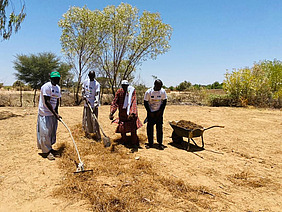(Frick, 07.11.2025) Agriculture is being severely affected by climate change worldwide: longer periods of drought, extreme weather conditions and crop failures are threatening food security. At the same time, the sector is responsible for a significant proportion of global greenhouse gas emissions.
COP30 in Belém provides a much-needed platform for strengthening adaptation strategies, innovations and policy frameworks for climate-resilient agriculture. For FiBL, this means bringing research findings from Switzerland and around the world directly into the international discussion.
FiBL is part of a global network that works with farmers, scientists and politicians to develop solutions for the agriculture of tomorrow. Organic farming offers concrete levers for this:
- Humus formation strengthens soil fertility and increases carbon storage.
- Optimised fertiliser management and closed nutrient cycles reduce harmful emissions and maintain soil fertility.
- Agroforestry systems increase productivity and climate resilience.
- Herd management reduces emissions and conserves resources.
FiBL presents research at COP30 and shows the way forward
Three practical examples show how organic and agroecological approaches can contribute to climate adaptation. These will be presented at FiBL's online event on 11 November at 3 pm CET at COP30 in Belém:
- "Are we saving the world?" – Results from a Swiss carbon farming project (Markus Steffens)
- "Agroforestry in the Sahel" – Evidence from Mali and Senegal (Harun Cicek, Christian Grovermann, Assane Beye, Tesfamichael Wassen)
- "Longer service life, fewer emissions" – findings from the dairy industry in Switzerland (Catherine Pfeifer)
FiBL's extensive experience demonstrates that only when research, policy, and practice work come together can agriculture become climate-resilient, productive, and sustainable. COP30 presents an opportunity to globally anchor organic and agroecological strategies as an effective response to the climate and food crises.
Further Information
FiBL contacts
- Jürn Sanders, Chairman of the Management Board, FiBL
- Adrian Krebs, Media Spokesperson, FiBL
Links
- fibl.org: Registration for the COP30 online event "Bridging Science, Practice, and Policy for Climate-Resilient Agriculture"
- fibl.org: SustainSahel
- fibl.org: Re-Livestock
- fibl.org: Soil Fertility & Climate
- fibl.org: Voices on Climate
- bioaktuell.ch: Practical information (in German and French only)




